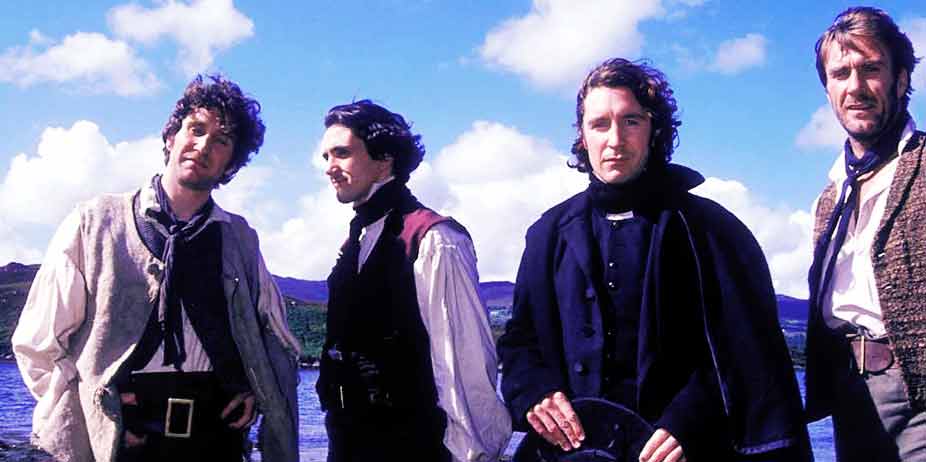
The Hanging Gale (1995)
In 1846, the Irish Potato Famine crisis left countless families evicted, thousands dead of starvation, and brought about a mass immigration to America. This four-part series chronicles one family's struggle to survive.
Rents are high in Ireland. The current land agent is hard-nosed man, unwilling to compromise. One afternoon, traveling a lonely road, he's murdered. One of the young men responsible, Daniel Phelan (Stephen McGann), has had his first taste of blood, to go with his schoolteacher education. He and others in the district hope and pray the replacement land agent has more compassion for the starving Irish farmers in the district.
Recently military retired Captain William Townsend (Michael Kitchen) arrives without pretense, but accustomed to following orders. The impoverished district concerns him, but his first priority is obedience to his British employer. The English ignore appeals to the mainland to reveal the worsening conditions among penniless tenants, citing that the Irish "complain too often." Townsend finds an unexpected ally in Michael Dolan (Barry Barnes), who tries to find peacekeeping methods in order to keep landowner and tenants from mutual violence. But when a horrific riot ends in Michael's death, the entire community sets against Townsend, whose response is to enforce the rent and evict anyone who cannot pay it. This threatens the Phelan family... Sean (Joe McGann) simply wants to provide for his family; Conor (Mark McGann) pines for Sean's wife, and earns a few extra pennies stick fighting; and Liam (Paul McGann) soon returns as a priest, to attempt to quell increasing dissent.
It's rare for me to find something I cannot cease watching, no matter how turbulent or disheartening the storyline. The McGann brothers have crafted an intricate, suspenseful, emotional look into one of England's most shameful periods -- the neglect, abandonment, and persecution of the Irish during the wet year when the potatoes rotted in fields, leaving no one anything to eat ... or sell. It doesn't shy away from the tremendous waste (people were evicted, and their homes burned down to prevent their return, and anyone in the district forbidden from taking them in) and horrific living conditions -- one scene has Liam carrying a dead child from a literal hovel, and burying her in the moss in the front yard. Sickness, injustice with the legal system, landlords unwilling to lower or forgo rent... it's all here, with a superb cast. Townsend is neither kind nor merciless; a man who adheres to the letter of the law, rather than the spirit -- it's easy to see why he makes enemies, yet the script never turns him into a complete villain. His compassion for a girl he turned out of her home, little glimpses into his previous life in the army, the loss of his wife, his frustrations, all bleed through, making the eventual showdown difficult to watch.
The film left me with mixed feelings -- it has a depressing conclusion for most of the characters, many of whom don't survive; but I find myself wanting to revisit it, to sink further into its historical truths. Everything about it feels incredibly real, including Liam's struggle with his faith throughout -- he arrives full of hope and confident that God's will transcends all things, and near the end confesses that all he feels is an intense desire to seek vengeance. His storyline is somewhat unresolved, but his continued presence as a priest leads me to suspect he either found some form of peace, or continues in his faith seeking answers. It's certainly not a feel-good miniseries, but it accomplishes more than most, in that it both raises indignation toward this mistreatment, and grants understanding into its "villain."
Sexual Content:
A man overhears a married couple having sex (episode one); a
drunk man makes advances to a woman (he holds her close and smells her hair; she
begs him not to "do this" and he lets her go); an unmarried couple are shown
together in bed, after -- he gets up (brief side nudity), whips the sheet off
her (revealing her breasts), and accuses her of not being a virgin for their
first time; we see her breasts again as she dresses (episode four). The same
episode shows a woman bathing (side breast nudity); episode three shows a
woman's nipple as she tries breast feeding.
Language:
Jesus' name is taken in vain a dozen times. Occasional
profanities.
Violence:
A man is brutally beaten almost to death, then drowned;
brawls become violent (men hit one another with sticks; one has his nose broken,
the other is severely concussed and nearly dies); a mob tries to hang a man; a
man has the back of his head blown off with a bullet (blood spurts, gory wound);
three men try to murder someone; after shooting him and his horse (blood
spurts); he shoots one in the head (distant), then "hangs" the second, ensuring
the rope isn't secured so he breaks his leg by falling to the ground below;
another man is hanged; defending their home, a man throws hot water on an
invading soldier, scalding his face; a shoot-out in a house leaves one man dead.
Other:
Vomiting. A girl eats poison berries to try and induce an
abortion.
